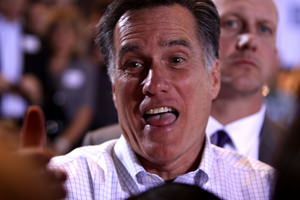Romney’s Big Problem
Mitt Romney has lost his central asset. It is no longer obvious that he is the Republican with the best chance of defeating President Obama.
Mitt Romney has lost his central asset. It is no longer obvious that he is the Republican with the best chance of defeating President Obama.
Romney was never fully trusted or liked by the staunchest conservatives, a rather large Republican constituency. But until now, enough of them have been willing to swallow their doubts at critical moments because they believed the former Massachusetts governor was the one potential nominee who could win the election.
This is not true anymore. Reflecting the damage Romney’s image has suffered in the six weeks since voting started in Iowa, he is running little better than Rick Santorum, now his main opponent, in matchups with the president. And both of them are losing.
In the latest New York Times/CBS Poll, released on Tuesday, Romney was behind Obama by six points, while Santorum trailed by eight — a margin-of-error sort of difference. By contrast, the struggling Newt Gingrich trailed by 18 points. Similarly, a recent Pew Research survey found Romney behind Obama by eight points, Santorum was losing by 10, and Gingrich by 18. And a Public Policy Polling survey actually found Santorum running a net two points better than Romney against the incumbent.
As long as Gingrich was his main competitor, Romney had a potent electability argument. But Santorum can say that since he is more or less equally strong against the president, conservatives might as well vote their convictions and their hearts.
Romney’s case for his strength as a general election candidate was built on a series of once plausible propositions: (1) a weak economy makes Obama highly vulnerable; (2) this election will thus be about economic and not social issues; (3) the strongest Republican argument is that the economy needs better management and that Romney is the quintessential economic manager — “Obama Isn’t Working” is still the shrewdest slogan he has come up with; and (4) Romney’s business experience solidifies the claims of point No. 3.
The currently positive trends on jobs and growth may or may not hold — and a crisis with Iran could discombobulate the economies of Europe and the United States. But Romney has to win the nomination now, and the stronger the economy is during the primary period, the weaker the first three pillars of his rationale become.
Moreover, Romney’s career in private equity at Bain Capital is now, at best, a mixed asset. The attacks on Romney’s business background from Gingrich and from Rick Perry, while he was a candidate, created an entirely new dialogue about Romney’s wealth, the low tax rates he pays, his foreign accounts, and the larger question of whether Romney can appeal to the white working-class voters who are so vital to a Republican victory, particularly in the Midwest. It’s striking that in this swing region, Pew found Obama with an 11-point lead over Romney, and a 10-point lead over Santorum. With numbers like that in the heartland, a Republican can’t win.
And here is the delicious paradox of 2012: By forcing the issue of economic inequality onto the national agenda, Occupy Wall Street may unintentionally play a large role in the Republican primaries — perhaps especially in blue-collar Michigan, which votes on Feb. 28.
Romney’s vast financial holdings become a real problem for him if the nation’s mind is focused on great disparities of wealth and income. By contrast, Santorum’s working-class roots serve him well in this new environment, even if his economic policies would likely aggravate inequities.
The worst part for Romney is that the best case against Santorum on the matter of electability involves the former Pennsylvania senator’s positions on social issues, which are well to the right of the center. Yet if he goes after Santorum as too socially conservative to win in the fall, Romney risks casting himself as to Santorum’s left on social and moral questions. And it is precisely Romney’s image as an inconstant conservative that created an opening for Santorum on the Republican right in the first place.
Romney is probably praying for a partial Gingrich comeback, with Gingrich concentrating his fire on Santorum. No longer able to lean on good general election poll numbers and private-sector savvy, Romney needs to figure out an entirely new case for himself. And unrelenting attacks on the latest interloper to challenge his “inevitability” may become less effective because Romney has already gone there so often.
Romney has to hope that Team Obama starts unloading on Santorum. The former front-runner may not be able to win this thing by himself.
E.J. Dionne’s e-mail address is ejdionne(at)washpost.com.
© 2012, Washington Post Writers Group
Your support matters…Independent journalism is under threat and overshadowed by heavily funded mainstream media.
You can help level the playing field. Become a member.
Your tax-deductible contribution keeps us digging beneath the headlines to give you thought-provoking, investigative reporting and analysis that unearths what's really happening- without compromise.
Give today to support our courageous, independent journalists.






You need to be a supporter to comment.
There are currently no responses to this article.
Be the first to respond.